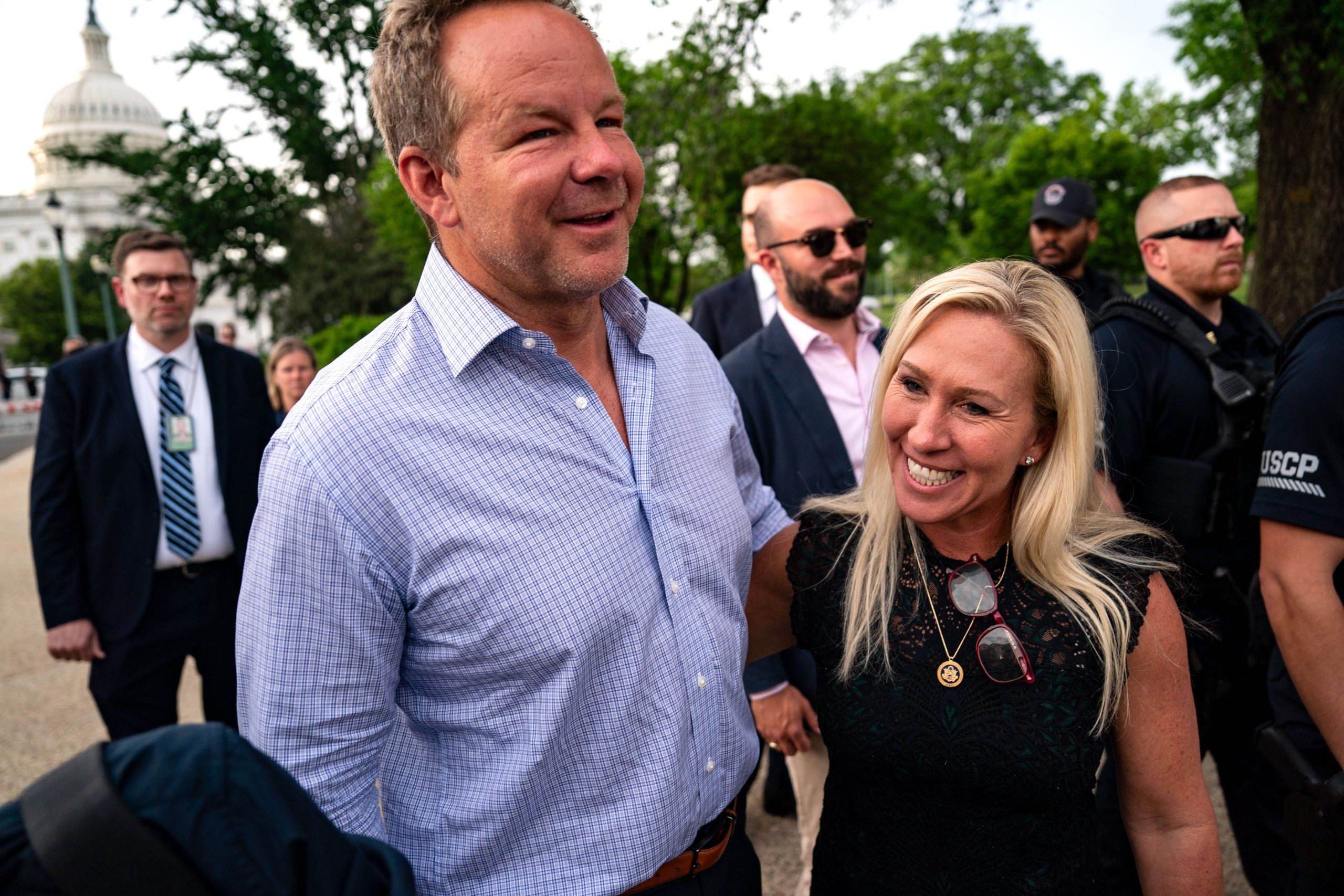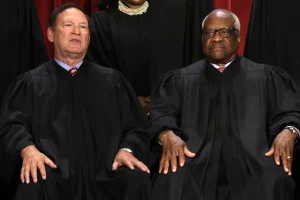Representative Marjorie Taylor Greene’s sudden decision to resign from Congress has captured national attention, intensifying the ongoing saga of her public disagreements with former President Donald Trump. Greene, who has represented Georgia’s 14th congressional district since 2021, announced she would step down in early January, citing frustration with the party leadership, personal concerns for her family, and a desire to avoid a politically damaging primary battle. Her resignation comes after months of escalating tension with Trump, who recently labeled her a “traitor” following her calls for the release of sensitive documents related to convicted sex offender Jeffrey Epstein.
Greene’s career has been defined by her willingness to challenge both political opponents and former allies. Once considered one of Trump’s most loyal supporters, she played a key role in advancing many “Make America Great Again” initiatives and aligned closely with his political vision during his first term. Over time, however, her relationship with Trump cooled, with disagreements over policy decisions, foreign affairs, and the handling of confidential government files leading to public friction. In her resignation announcement, Greene stressed that her decision was driven by the need to maintain personal integrity and to protect her constituents from a divisive primary battle.
Throughout her tenure, Greene has been one of the most polarizing figures in Congress. She quickly rose to national prominence due to her outspoken positions on controversial issues such as gun rights, abortion, and border security, and she became a prominent voice for the conservative movement. Her early political career included affiliations and associations that drew widespread scrutiny, yet she consistently defended her positions, arguing that her duty was to represent her district and fight for her interpretation of conservative principles.
In the wake of her announcement, Greene’s boyfriend, Brian Glenn, issued a passionate statement in support of the congresswoman. Glenn, the Chief White House Correspondent for the Real America’s Voice channel, has been Greene’s partner for the past two years and has maintained a close public relationship with her despite the political pressures surrounding her resignation. Glenn’s statement praised Greene’s courage, perseverance, and commitment to standing by her principles, even when faced with public criticism and threats.
—Insert Brian Glenn’s X post here—
Glenn’s post underscores his admiration for Greene’s tenacity and her steadfast approach to her work in Congress. He highlights the personal qualities that have made Greene a compelling figure to her supporters: her resilience, her dedication to her constituents, and her refusal to be intimidated by political adversaries. Glenn’s words are echoed by Greene’s daughter, Lauren Greene Sanders, who has publicly expressed pride in her mother’s accomplishments and unwavering adherence to her principles, describing her as “one of a kind” and a fighter for the America First agenda.
While Greene’s supporters celebrate her integrity, her departure from Congress marks the end of a contentious chapter in Georgia politics. Greene’s resignation is not simply a personal decision; it also carries significant implications for the Republican Party and for the balance of power in her district. Analysts suggest that the absence of a high-profile, polarizing figure like Greene may reshape the political landscape, potentially affecting voter turnout, primary dynamics, and Republican strategy in upcoming elections.
The resignation also sheds light on the complex relationship between Greene and Trump. Once her political ally and promoter, Trump’s public denunciation of Greene as a “traitor” after she criticized his stance on releasing Epstein-related documents appears to have contributed significantly to her decision to step down. Trump, when asked about Greene’s resignation, expressed little concern, calling it “great news” and suggesting that the country would benefit from her departure. His reaction underscores the ongoing tensions within the Republican Party, particularly between figures loyal to Trump and those seeking to assert independent political authority.
Greene’s decision to resign is influenced not only by political calculations but also by personal considerations. In her statement, she noted the intense pressures and threats she faced as a result of her high-profile position and her public disagreements with Trump. Greene emphasized that her resignation was intended to protect her family, maintain her dignity, and avoid a fractious primary election that could harm her constituents. Her focus now appears to be on ensuring a smooth transition and remaining engaged in public life on her own terms, outside the confines of congressional office.
Brian Glenn’s support plays a key role in this transition. As both a romantic partner and a fellow conservative media figure, Glenn has publicly reinforced Greene’s narrative of courage and principle. By amplifying her achievements and defending her against criticism, he provides a personal and political counterbalance to the attacks Greene faced from Trump and his allies. Greene’s daughter, Lauren Sanders, has similarly reinforced the message of familial support, praising her mother’s career and underscoring her dedication to American values.
The public attention surrounding Greene’s resignation highlights broader questions about party loyalty, personal integrity, and political survival. Greene’s career trajectory demonstrates the challenges faced by legislators who simultaneously seek to uphold personal convictions while navigating the pressures of party politics. Her decision to step down, particularly in light of her contentious relationship with Trump, reflects the tensions inherent in modern American conservatism, where personal loyalty, political alliances, and public perception often collide.
Observers note that Greene’s departure may prompt broader reflection within the Republican Party regarding the balance between ideological fidelity and pragmatic political strategy. Figures like Greene, who are willing to challenge party orthodoxy, can inspire supporters but also provoke internal friction, particularly when their actions conflict with the preferences of powerful party figures. Greene’s resignation therefore has implications beyond her own career, as it may influence the party’s approach to dissent, media strategy, and engagement with grassroots supporters.
While Greene exits the political stage, her influence is likely to endure through her supporters, public statements, and media presence. Her record, which includes championing high-profile conservative initiatives and advocating for her constituents’ interests, continues to resonate with a significant segment of the electorate. The support expressed by her boyfriend, Brian Glenn, and her daughter demonstrates the strength of her personal network and suggests that she will remain a vocal figure in political and media circles even after leaving Congress.
Greene’s resignation also raises questions about the evolving dynamics of conservative politics in the United States. Her split with Trump illustrates the complexities of maintaining political alliances when individual principles clash with party loyalty. It also highlights the ways in which personal relationships, public perception, and political strategy intersect, shaping the careers of high-profile lawmakers. Greene’s careful framing of her departure, emphasizing dignity, family, and principle, positions her as a figure who values ethical consistency over political expediency.
As political observers analyze the implications of Greene’s resignation, her departure is likely to have a ripple effect across the Republican Party and the broader American political landscape. The removal of a high-profile, often controversial figure like Greene may create opportunities for new voices within the party, while also prompting discussion about how party leadership manages dissent and internal disagreements.
Despite the public scrutiny and political fallout, Greene’s legacy as a determined and outspoken legislator remains. Her career exemplifies the tensions and contradictions inherent in contemporary American politics, where media visibility, personal conviction, and party loyalty intersect in ways that can simultaneously elevate and challenge political figures. The outpouring of support from her boyfriend and daughter highlights the enduring personal and emotional dimensions of her political journey.
As Greene prepares to step down, attention will likely shift to her future endeavors, whether in media, activism, or other avenues of influence. Her ability to maintain a platform and inspire supporters outside of Congress may determine the next phase of her public career. The statements from Brian Glenn and Lauren Greene Sanders serve as a reminder that even in political transitions, personal support networks play a critical role in shaping public perception and maintaining influence.
In conclusion, Marjorie Taylor Greene’s resignation from Congress represents both a personal decision and a significant political event. Her departure, influenced by disagreements with Donald Trump and concerns for her family and personal dignity, marks the end of a high-profile and often contentious chapter in American politics. With the steadfast support of her boyfriend and daughter, Greene’s principles and public presence are poised to continue shaping conservative discourse and political debate in the years ahead.
Glenn’s words, emphasizing Greene’s courage, determination, and dedication to America, provide readers with a firsthand view of the personal support behind one of the most polarizing figures in recent congressional history.

Emily Johnson is a critically acclaimed essayist and novelist known for her thought-provoking works centered on feminism, women’s rights, and modern relationships. Born and raised in Portland, Oregon, Emily grew up with a deep love of books, often spending her afternoons at her local library. She went on to study literature and gender studies at UCLA, where she became deeply involved in activism and began publishing essays in campus journals. Her debut essay collection, Voices Unbound, struck a chord with readers nationwide for its fearless exploration of gender dynamics, identity, and the challenges faced by women in contemporary society. Emily later transitioned into fiction, writing novels that balance compelling storytelling with social commentary. Her protagonists are often strong, multidimensional women navigating love, ambition, and the struggles of everyday life, making her a favorite among readers who crave authentic, relatable narratives. Critics praise her ability to merge personal intimacy with universal themes. Off the page, Emily is an advocate for women in publishing, leading workshops that encourage young female writers to embrace their voices. She lives in Seattle with her partner and two rescue cats, where she continues to write, teach, and inspire a new generation of storytellers.









